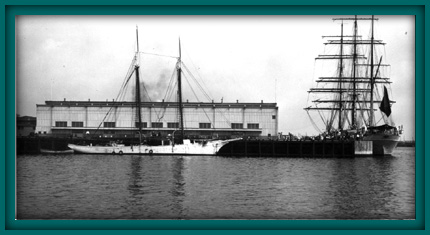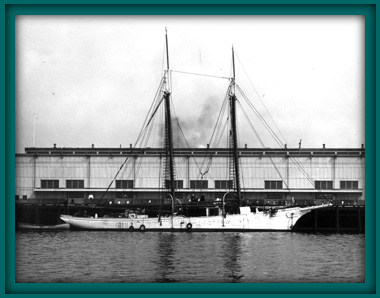|

The Morrissey was raised and sold for $500
to the Pequot Marine Corporation of New London, CT and
towed to Rowayton, CT. She was then sold to Louisa Mendes
of Egypt, MA whose father-in-law, Henrique Mendes, paid
$7,000 for the old schooner and brought her to New
Bedford where his son, Adilino, and friends spent many
hours during the next six months getting the ship ready
to sail.
 In the spring of the year
the ship was hauled at the Casey Boatbuilding Yard in
Fairhaven where the engine, propeller and shaft were
removed. The ship would sail with no auxiliary power
after extensive repairs, scraping and painting. In
addition, a new galley stove and new boom for the
foremast were installed. In the spring of the year
the ship was hauled at the Casey Boatbuilding Yard in
Fairhaven where the engine, propeller and shaft were
removed. The ship would sail with no auxiliary power
after extensive repairs, scraping and painting. In
addition, a new galley stove and new boom for the
foremast were installed.
The Morrissey
replaced another Cape Verdean packet in New Bedford, the three-masted schooner Lucy Evelyn captained by
John Costa, after the Lucy Evelyn was sold at
auction in early June.
Interview with Adilino and Louisa
Mendes April 1, 1988:
The actual legal purchase [of
the schooner Effie M. Morrissey] was made by
Adilino’s wife Louisa, because she was an
American citizen. In order to raise the nearly $7,000
purchase price, Henrique had worked in an East
Weymouth wool factory during World War II. He still
had to borrow some money from Adilino, as he
[Henrique] had gone bankrupt some time before.
"There was no money involved, it was all
volunteer - the fellowship was wonderful," said
Louisa Mendes. "Henrique could really talk
people into things," said Adilino, referring to
Henrique’s ability to get friends to help fix up
the ship. "Thirty or forty people would be
working at a time, everyone with a can of paint in
their hand." Louisa remembered that Henrique
used to hang a pair of bib dungarees on the ship
where people on the dock would see them, so that
people would know how hard he worked.
One of the happiest memories of
Adilino and Louisa Mendes was the year spent fixing
the ship up in 1948. Adilino and Louisa had a baby
daughter at the time, and they just brought her
along, where she was rocked to sleep by the movement
of the ship. Adilino said, "Kids used to play on
the ship all the time."
The Mendes described the work
done on the ship: "We got the mud out (from the
sinking), scraped the burnt wood, took out all of the
burnt cabins and recreated the cargo hold. We
replaced all of the burnt wood and changed some
knees."
Henrique owned seventeen
different vessels over the years. One was named Emma
after one of his daughters. He bought the Wm. A.
Grosier in 1914, the Ernest T. Lee in 1919, the
Charles L. Jeffrey in 1927, the Frank Bernard in
1935. He also had ships named the Arnold and the
Savoia. He kept the Effie M. Morrissey under American
registration and under that name for one year, until
1949 when he sailed her to Lisbon and renamed her
after his thirty-four year old daughter, Ernestina.
Henrique is remembered by his
son as "a happy-go-lucky guy, a big guy,
sociable and so popular." Adilino recounted how
his father is still owed money by some passengers.
"They would promise to pay when they got to the
United States and had been able to work for a while.
Some paid, some didn’t. Henrique was very
generous." In the 1950’s a round trip fare
to Cape Verde and back was $400. If passengers
brought lots of possessions with them (they often
did), they paid extra. Some people would even send
their possessions down on the ship and fly
themselves.
On August 18, 1948 the Effie M.
Morrissey sailed from the New Bedford State Pier with
assistance from the tug Viking with Capt. Jose Joaquin Pereira of 212 N. Second Street, New Bedford aboard
and seventy tons of cargo including food and clothing for
Cape Verde. The crew were Manual A. Andrade of New York,
Benjamin Duarte of Jersey City, Joseph Lopes of North
Carver, Peter Silva of 511 Purchase Street, New Bedford
and Manuel Sylvia of 620 Purchase Street, New Bedford.
The only passenger making the voyage,
Antonio Gomes, 65, looked forward to the journey. In the
United States many years, he had not been able to visit
the islands and his wife since 1938. Mr. Gomes, a section
hand on the Woods Hole branch of the New York, New Haven
and Hartford Railroad, intended to return after a few
months.
After a 34-day passage the Morrissey
made the Cape Verde Islands with no engine, the first in
a dozen circumnavigations in subsequent years through
1965.
|